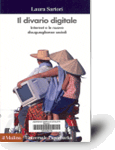![]()

Il Divario digitale: Internet e le nuove disuguaglianze sociali
Laura Sartori
abstract
New economy, information society, network society, post-industrial society, knowledge economy, e-society. All these labels are indicative of the enormous scope of the historic changes taking place nowadays, and highlight new electronic communications technology as a decisive component of them. The amazing possibilities that have opened up for us, thanks in particular to the Internet, nevertheless go hand-in-hand with new inequalities. It was the UN Secretary-General who declared, speaking of developing countries, "people lack many things: jobs, shelter, food, health care and drinking water. Today, being cut off from basic telecommunications services is a hardship almost as acute as these other deprivations". But even in developed countries, where material deprivation is more limited, disparities in access to new communications technology have a serious impact.
This phenomenon, known as the "digital divide", is the subject of an increasing number of surveys, debates, speeches and policies. This volume paints a comprehensive picture of it, accompanied by a wealth of information and data.
keywords
information retrieval, Internet, knowledge society, new information technologies
catalogue card
Title: Il Divario digitale: Internet e le nuove disuguaglianze sociali
Author: Laura Sartori
Publication: Bologna: Il mulino, cop. 2006
ISBN: 88-15-10970-6
index
Introduzione. Che cos'è il divario digitale?
1. Le origini del fenómeno
2. Una prospettiva multidimensionale
I. Dall'accesso all'uso: ipotesi e classificazioni
II. Alla scoperta del digital divide: le differenze tra paesa
III. Il divario sociale: le differenze tra individui e famiglie
IV. Le disuguaglianze nell'uso
V. La "governance" di Internet e le disuguaglianze digitali
Editorial

in-deph
Innaugural lecture of the UOC's 2006-2007 academic year
Learning to live together, by Mustapha Cherif
The primary condition for peace, presentation by the rector Imma Tubella
Counterpoint, by Xavier Rubert de Ventós
miscellany
Optimum online shopping and surfing experiences, by Inma Rodríguez
Does persuasive communication constitute the communicative paradigm of the knowledge society?, by Ferran Lalueza
The Barcelona model of e-administration: adoption and institutionalisation, by José Ramón Rodríguez
The influence of the knowledge society on the modernisation of the Public Administration, de J.Á. Martínez, P. Lara-Navarra and P. Beltrán
The 2.0 teacher: teaching and research from the Web, by I. Peña, C. Córcoles and C. Casado

Reassembling the Social. An Introduction to Actor-Network-Theory, by Bruno Latour.
Per Eduard Aibar
On intelligence, by J. Hawkins and S. Blakeslee. By Salvador Climent

 TRAMULLAS, J.; GARRIDO, P. (2006). Software libre para servicios de información digital
TRAMULLAS, J.; GARRIDO, P. (2006). Software libre para servicios de información digital
 SARTORI, Laura. (2006). Il Divario digitale: Internet e le nuove disuguaglianze sociali
SARTORI, Laura. (2006). Il Divario digitale: Internet e le nuove disuguaglianze sociali
 PENNEC, Simone. (dir.) (2005). Technologies urbaines, vieillissements et handicaps
PENNEC, Simone. (dir.) (2005). Technologies urbaines, vieillissements et handicaps
 WILHELM, Anthony G. (2004). Digital Nation: Toward an Inclusive Information Society
WILHELM, Anthony G. (2004). Digital Nation: Toward an Inclusive Information Society
 LANDOW, George P. (2006). Hypertext 3.0: Critical Theory and New Media in an Era of Globalitzation
LANDOW, George P. (2006). Hypertext 3.0: Critical Theory and New Media in an Era of Globalitzation
 TAYLOR, Charles (2006). Imaginarios sociales modernos
TAYLOR, Charles (2006). Imaginarios sociales modernos
 The texts published in this journal, unless otherwise indicated, are subject to a Creative Commons Attribution-Noncommercial-NoDerivativeWorks 2.5 licence.
It may be copied, distributed and broadcast provided that the author and UOC Papers are cited. Commercial use and derivative works are not permitted. The full licence can be consulted on http://creativecommons.org/licenses/by-nc-nd/2.5/es/deed.en
The texts published in this journal, unless otherwise indicated, are subject to a Creative Commons Attribution-Noncommercial-NoDerivativeWorks 2.5 licence.
It may be copied, distributed and broadcast provided that the author and UOC Papers are cited. Commercial use and derivative works are not permitted. The full licence can be consulted on http://creativecommons.org/licenses/by-nc-nd/2.5/es/deed.en





